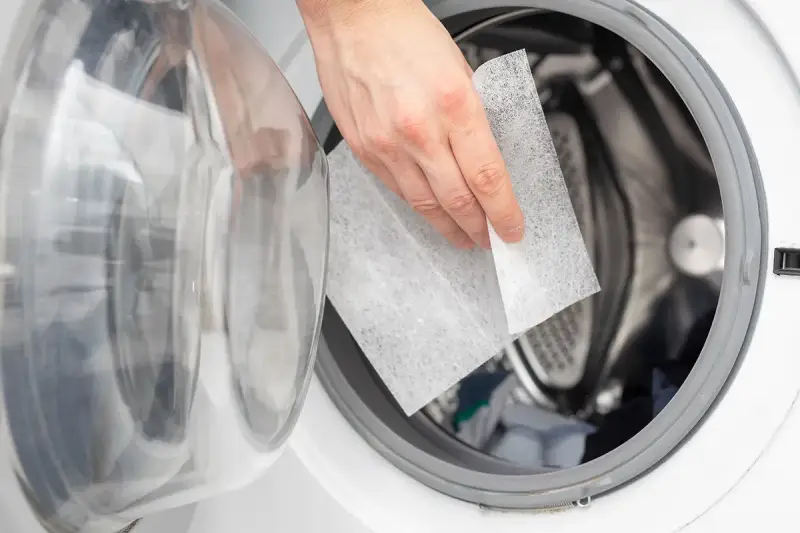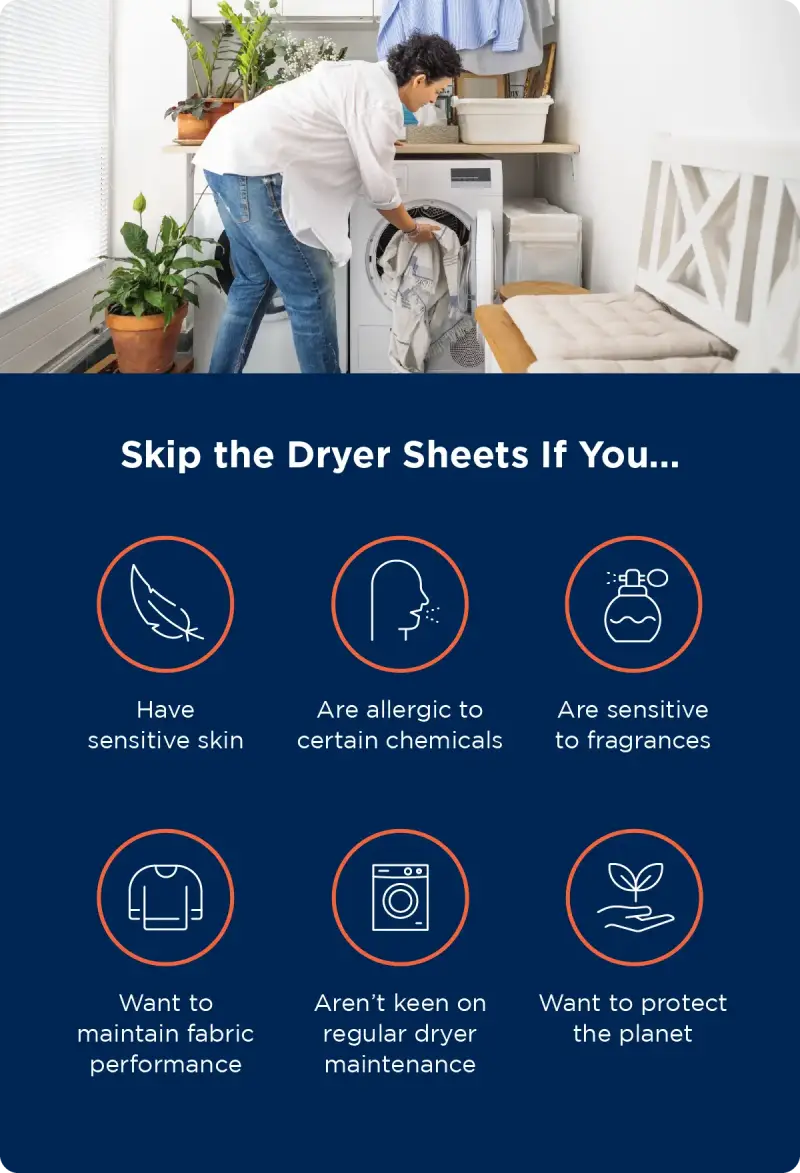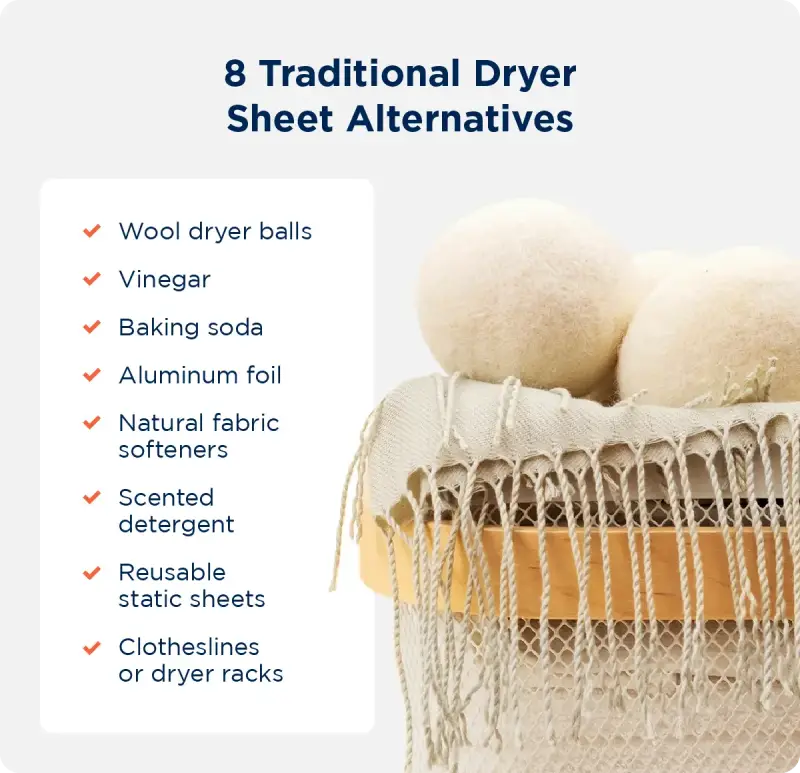Are Dryer Sheets Bad? 6 Reasons To Avoid Them (& Alternatives)

Are dryer sheets bad? With names like Bounce, Downy, and Snuggle, it’s hard to believe anyone would sound the alarm. But recently, some have questioned whether this small luxury is doing their clothes, skin, and dryer more harm than good.
While it’s true that some dryer sheets could be “bad” for your dryer by creating residue, most of them are no worse than your detergent. But are dryer sheets bad for you? It’s possible that some types may be.
We’ll delve into the debate about dryer sheets, their effect on your health, and your dryer’s longevity so you can decide if they’re right for you.
What Is a Dryer Sheet?
Dryer sheets are a laundry room staple, beloved for their signature freshly-washed-linen aroma and ability to make even the rattiest T-shirts feel soft and new. These thin, typically disposable fabric sheets are coated with chemicals and fragrances designed to reduce static cling, soften fabrics, and leave a pleasant scent on your laundry after the drying cycle.
How Do Dryer Sheets Work?
Dryer sheets work by coating fabric with a thin layer of lubricants, silicone, and anti-static agents during the drying cycle. This coating reduces friction between garments as the sheet heats up and releases its contents into the dryer.
Dryer sheets also help by:
- Reducing static electricity: When clothes tumble in the dryer, friction between fabrics can generate static electricity and cause static cling. The anti-static agents in dryer sheets help neutralize this electric charge, minimizing static cling and making clothes less likely to stick together.
- Softening fabrics: The lubricants and silicone in dryer sheets create a smooth, lubricated surface on fabrics. This can help reduce rough fibers, making clothes feel softer. The coating also helps prevent the buildup of static charges that can make fabrics stiff.
- Reducing wrinkles: The lubricating agents in dryer sheets can also help reduce friction between clothes, potentially minimizing wrinkles and making garments easier to iron.
- Capturing lint and debris: Some dryer sheets have properties that help capture lint and small debris during the drying process, which can keep clothes looking cleaner.
Common Dryer Sheet Ingredients
Dryer sheets are made from polyester fibers coated with a softening agent, such as fatty or stearic acids. Silicone-based ingredients are also often included to enhance the softening effect by creating a smooth coating on the fabric's surface, creating a softer feel and preventing the buildup of static electricity.
Another key ingredient found in many dryer sheets is fragrance. These fragrances can be either synthetic or derived from natural sources.
Are Dryer Sheets Bad for You?
While the chemicals in dryer sheets are generally recognized as safe, more research is needed to determine the potential health effects of scented laundry products.
In one study of five name-brand dryer sheets, researchers found that the sheets emitted 15 endocrine-disrupting compounds associated with asthma. Even though dryer sheet toxicity is still disputed, if you have sensitive skin, asthma, or migraines, it may be worth finding and using an alternative to dryer sheets, like dryer balls or a mild fabric softener.
Are Dryer Sheets Bad for Your Dryer?
There is some debate about whether dryer sheets are good or bad for your dryer. The answer lies somewhere in the middle of extremes. The heat from the dryer can melt the acids that coat dryer sheets, covering your dryer with a sticky coating.
Though you may not notice this coating right away, it can build up on the dryer lint filter over time. If the filter becomes clogged, your dryer may fail to dry clothes properly, turn off midway through running, or run without heating up.
To avoid this, keep the filter properly maintained and clean up residue on other parts of the dryer regularly.
Typically, dryer sheets are no worse for your dryer than detergent. If you practice good dryer maintenance and cleaning, you can continue to use dryer sheets in your dryer.

6 Reasons To Avoid Using Dryer Sheets
While dryer sheets have long been a staple in the quest for soft, static-free clothes, there are reasons some people choose to avoid them. From concerns about chemical ingredients to environmental impact, here are six reasons why some people avoid using dryer sheets:
1. Skin Irritants
One compelling reason to stop using dryer sheets is the potential for skin irritation caused by the chemicals found in these products. Dryer sheets often contain a mixture of fragrances, softening agents, and other chemical compounds that can leave a residue on clothing.
For individuals with sensitive skin or those prone to allergies, the residue may lead to skin irritation, redness, or itching.
Pro tip: Opting for alternative methods of fabric softening or fragrance, such as fragrance-free fabric softener, essential oils, or natural alternatives like wool dryer balls, can be a suitable choice for individuals with skin sensitivity concerns.
2. Allergen Sensitivities
In addition to skin irritations, some people may be allergic to the chemicals found in dryer sheets. Synthetic fragrances, in particular, are common allergens that may cause respiratory issues, headaches, or skin reactions in sensitive individuals. For those with allergies or asthma, wearing clothes dried with dryer sheets may exacerbate symptoms.
3. Fragrances
Synthetic scents, often designed to impart a pleasant aroma to freshly washed clothes, can pose concerns for those with fragrance sensitivities or allergies. What’s more, the specific chemicals used in synthetic fragrances are not always disclosed on product labels due to proprietary formulations, making it challenging for consumers to identify potential allergens.
Pro tip: If you need to keep dryer sheets in your laundry routine, switch to a fragrance-free or non-scented option to alleviate migraines and other scent-activated sensitivities.
4. Residual Fabric Coating
While the coating left by dryer sheets is designed to soften fabrics and reduce static cling, it also raises concerns for the longevity of your garments. Over time, residue accumulation on clothes may lead to decreased fabric breathability and reduced absorbency, affecting the performance of items like towels and athletic wear.
Some people find that avoiding dryer sheets altogether helps maintain the natural texture and absorbency of their clothing, making it an appealing choice for those who prioritize the durability and functionality of their fabrics.
5. Drum and Vent Residue
As mentioned, dryer sheets can lead to residue buildup in the interior and vents of your dryer over time, which may pose issues like:
- Reduced airflow and ventilation
- Overheating
- Longer drying times
- Increased energy consumption
- Improper heat transfer
- Potential fire hazards
If you are an avid dryer sheet user, make sure to regularly clean your dryer vents and wipe down the interior of the unit to keep it running smoothly.
Pro tip: One simple way to help maintain the longevity of your dryer is to clean the lint filter after every load. This not only helps prevent lint and residue buildup but also maintains drying efficiency.
6. Environmental Concerns
With consumers now realizing just how big their environmental footprint is, the use of dryer sheets has been under fire. In 2022, the Environmental Working Group published additional information encouraging users to skip dryer sheets, noting that “heat-activated dryer sheets can pack a powerful combination of chemicals that can harm your health, damage the environment and pollute the air, inside and outside your home.”
Given the disposable nature of most dryer sheets, their use also adds to household waste, further amplifying environmental impact.
Pro tip: If you want to minimize your environmental impact, opt for reusable alternatives like wool dryer balls.
Dryer Sheet Alternatives
As consumers become more aware of the health and environmental impact of dryer sheets, alternatives like dryer balls and reusable sheets are gaining prominence. Exploring these alternatives offers a promising step toward a greener and cleaner way to care for clothes.
- Dryer balls: Reusable wool dryer balls provide a natural way to soften fabrics, reduce static, and decrease drying time. They can be scented with essential oils if you prefer a fragrance.
- Vinegar: Adding a small amount of white vinegar to the rinse cycle can act as a natural fabric softener, reducing static and leaving laundry feeling fresh without the need for chemical-laden sheets.
- Baking soda: Placing a box of baking soda in the laundry area or adding it directly to the wash can help eliminate odors and soften fabrics.
- Aluminum foil: A rolled-up ball of aluminum foil can help reduce static in the dryer. It works by absorbing electrical charges, preventing clothes from clinging together.
- Natural fabric softeners: Commercially available natural fabric softeners, often plant-based and free from synthetic fragrances and dyes, offer a gentler alternative to traditional dryer sheets.
- Scented detergent: Scented detergents provide both cleanliness and desired scent without the need for additional dryer sheets.
- Reusable static sheets: Reusable static sheets, made from materials like silicone, can reduce static without the need for disposable sheets.
- Clotheslines or drying racks: Air-drying clothes on a clothesline or using drying racks not only eliminates the need for dryer sheets but also saves energy and provides a fresh, natural scent to laundry.

FAQ About Dryer Sheets
If you've ever wondered about the impact of dryer sheets on your health, skin, or the environment, you've come to the right place. We answered some of the most common questions to help you decide if using dryer sheets should be a part of your laundry routine.
Are Dryer Sheets Good or Bad for You?
Whether dryer sheets are good or bad for you depends on your individual sensitivities. If you have sensitive skin or allergies, you may want to avoid using dryer sheets. Chemicals and fragrances added to dryer sheets have been known to irritate skin, cause headaches, and even trigger asthma. Environmental concerns may also deter you from using dryer sheets.
Is It Better To Use Fabric Softener or Dryer Sheets?
Both fabric softeners and dryer sheets prevent static and wrinkles while making clothes feel softer and smell fresher. However, they each have their benefits and drawbacks.
Liquid fabric softener, which you add to the washing machine during the wash cycle, permeates into the fabric and can help keep clothes from stretching, fading, and pilling. However, liquid softeners may stain clothes since they’re made from oil. Some users may prefer dryer sheets for their convenience.
Dryer Not Working? Contact Your Local Mr. Appliance!
While dryer sheets alone may not be a common culprit of dryer malfunctions, other factors like maintenance neglect and everyday wear and tear can result in issues like stuck drums or clogged vents.
If you notice any problems with your dryer, your local Mr. Appliance® is ready to help. When it comes to electric or gas dryer repair, our experts will quickly assess the issue and provide a reliable solution. Get started by scheduling service today.
This article is intended for general guidance only and may not be applicable to every situation. You are responsible for determining the proper course of action for your property and your situation. Mr. Appliance is not responsible for any damages that occur as a result of any advice or guidance derived from blog content. For the most accurate guidance, contact an independently owned and operated Mr. Appliance business for a professional custom and on-site assessment.
 Click to call
Click to call



